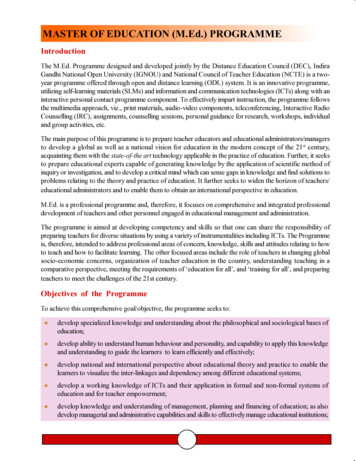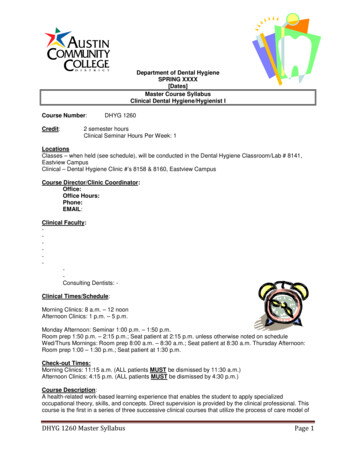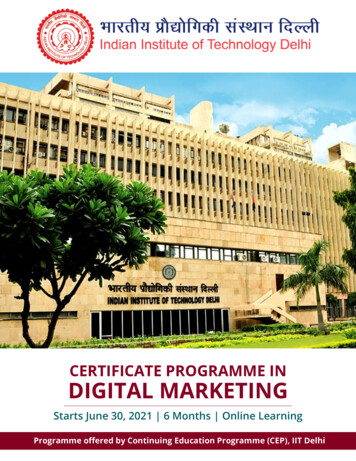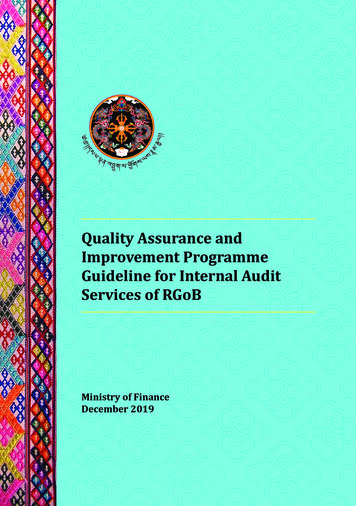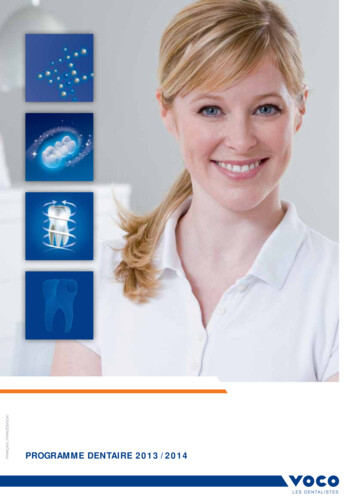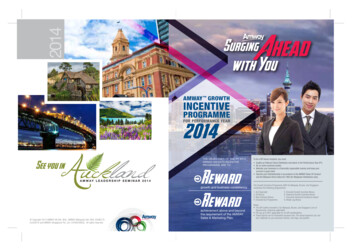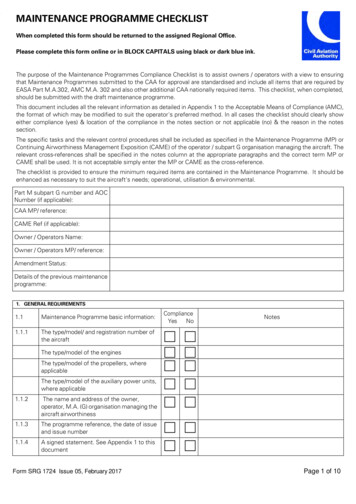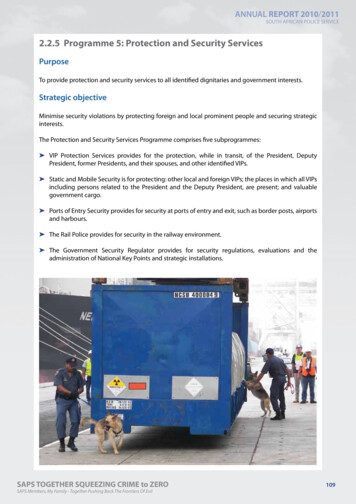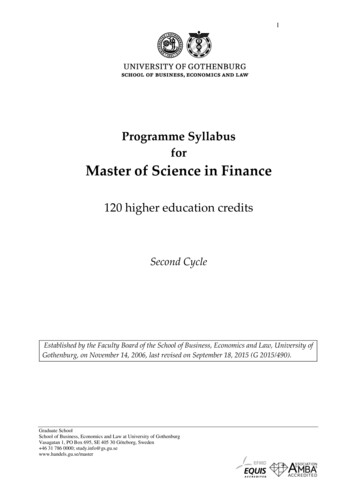
Transcription
1Programme SyllabusforMaster of Science in Finance120 higher education creditsSecond CycleEstablished by the Faculty Board of the School of Business, Economics and Law, University ofGothenburg, on November 14, 2006, last revised on September 18, 2015 (G 2015/490).Graduate SchoolSchool of Business, Economics and Law at University of GothenburgVasagatan 1, PO Box 695, SE 405 30 Göteborg, Sweden 46 31 786 0000; study.info@gs.gu.sewww.handels.gu.se/master
21. Decision and GuidelinesThe study programme for the Master of Science in Finance, 120 higher educationcredits, hec, (equals 120 ECTS credits), was established by the Faculty Board of theSchool of Business, Economics and Law, on November 14, 2006 and last revised onSeptember 18, 2015 (G 2015/490). The programme syllabus applies as from autumn termof 2016.2. General ObjectivesSecond cycle education shall according to the Swedish Higher Education Act (HEA)build on knowledge that students acquire in first cycle education or correspondingknowledge (HEA, Ch. 1:9). The general objectives for a Master (120 credits) are statedin the Higher Education Ordinance.3. Programme Specific Objectives (learning outcomes)After successfully completing the programme the student shall be able to:Knowledge and understanding demonstrate knowledge and understanding in Finance, including both broadknowledge of the field and a considerable degree of specialised knowledge incertain areas of the field as well as insight into current research and developmentwork, and demonstrate specialised methodological knowledge in Finance.Competence and skills demonstrate the ability to critically and systematically integrate knowledge andanalyse, assess and deal with complex phenomena, issues and situations evenwith limited information demonstrate the ability to identify and formulate issues critically, autonomouslyand creatively as well as to plan and, using appropriate methods, undertakeadvanced tasks within predetermined time frames and so contribute to theformation of knowledge as well as the ability to evaluate this work demonstrate the ability in speech and writing both nationally and internationallyto clearly report and discuss his or her conclusions and the knowledge andarguments on which they are based in dialogue with different audiences, and demonstrate the skills required for participation in research and developmentwork or autonomous employment in some other qualified capacity.Judgement and approach
3 demonstrate the ability to make assessments in Finance informed by relevantdisciplinary, social and ethical issues and also to demonstrate awareness of ethicalaspects of research and development work demonstrate insight into the possibilities and limitations of research, its role insociety and the responsibility of the individual for how it is used, and demonstrate the ability to identify the personal need for further knowledge andtake responsibility for his or her ongoing learning.4. OrganisationAll Graduate School programmes are managed by the Graduate School andgoverned by the Graduate School Board. Each Graduate School programme has aprogramme coordinator and a programme advisory committee.5. Programme Disposition and ContentYear 1Autumn TermPeriod 1 2Spring TermPeriod 1 2Period 3 4GM0715,GraduateEconometrics7.5 hecGM1003 Investments7.5 hecElective Course7.5 hecCoreCoreGM0701 AdvancedMicroeconomic Theory7.5 hecGM1002, FinancialInstitutions and Markets7.5 hecGM1008 FinancialEconometrics7.5 hecCoreCoreCorePeriod 3 4Spring TermPeriod 1 2GM0702 MathematicsorGM1001 Corporate Finance7.5 hecPeriod 3 4CoreYear 2Autumn TermPeriod 1 2Elective Course7.5 hecPeriod 3 4GM1015 Advanced Corporate Elective CourseFinance7.5 hec7.5 hecGM1060 Master Degree Project30 hecCoreElective Course7.5 hecElective Course7.5 hecCore
4The programme covers four academic terms of full-time study (120 hec) includingthree terms of courses, core and elective, 90 hec, and one term of Master Degree Project(thesis writing - 30 hec). Each term is divided into four periods, and each course is 7,5hec, except where noted.Core coursesCore courses are programme specific and include courses in methods with emphasis onqualitative and quantitative analysis.The initial part of the programme consisting of three intensive core courses (studentstake two of these), enables the students with a Bachelor s degree, but with differentmajors, to effectively participate in the programme. These second cycle courses;Advanced Microeconomic Theory (mandatory), Mathematics and Corporate Finance,cover the institutional and methodological background for future courses. In additionto the mandatory course Microeconomic Theory, the student takes one of the twoadditional courses that complete his/her previous studies most pertinently. Courseselection is dependent on the student’s background and decided by the GraduateSchool.The following core courses, year one, deals with financial institutions and markets,econometrics and investment. The courses give the student the theoretical knowledgeand empirical methodology necessary for independent work. In the second year of theprogramme the student has one core course, Advanced Corporate Finance (7.5 hec).The final phase, consists of the Master Degree Project (thesis writing, 30 hec).Master Degree Project (Master thesis)The fourth term is devoted to full time Master Degree Project writing under thesupervision of a faculty member.Elective coursesThe Graduate School offers a number of electives within economics, businessadministration, law, economic history and economic geography. The elective courseso f f e r e d may vary yearly depending upon faculty changes and number of registeredstudents.Study AbroadPossibility to study at one of our international partner universities is assessedindividually based on: Prior study results at Graduate School. English language proficiency based on the VOC/MCT-test results.
5Correspondence between available exchange courses, the purpose of theexchange and the programme specific objectives (learning outcomes – seeParagraph 3).6. Tuition and ExaminationThe language of instruction is English. Courses will include lectures, seminars and casestudies. The students will also work together in small groups, according to educationalprinciples such as problem-based learning, experiential learning and action learning.The courses will be examined separately. Group reports will be assessed and gradedindividually, as will individual term papers and individually written exams.The Graduate School is obliged to offer the exam at least five times during the course ofeach two year period. Students who have made five unsuccessful attempts to pass anexam have lost the possibility of obtaining the Master of Science Degree.7. Admission Requirements and Selection ProcessGeneral Entrance RequirementsTo meet the entry requirements for master's level (second cycle or graduate) studies,students must: have been awarded a Bachelor's degree (equivalent toKandidatexamen) from an internationally recognized university be able to demonstrate proficiency in English equivalent to English studies atupper secondary school (high school) in Sweden, called English 6/EnglishCourse B.aSwedishFor more information about General Entrance Requirements seewww.universityadmissions.se (English) and www.antagning.se (Swedish).Programme Specific Entrance Requirements – Master of Science in FinanceA) The applicant’s university education must include the followingcourses:i. a m i n i m u m o f 7 , 5 h e c i n F inanceii. a m i n i m u m o f 1 5 h e c i n Microeconomics (of which at least 7,5 hec is onintermediate level)In addition the education must include a minimum of 15 hec in Statistics, or 7.5hec in Statistics and 7.5 hec in quantitative methods and/or Mathematics.OrB) The applicant’s university education must include at least a Bachelor’s Degree (i.e.the equivalent of 180 hec) in Mathematics or in an Engineering programme with aquantitative or mathematical orientation.
68. Degree Certificate and Degree TitleUpon completion (receiving a minimum grade of Pass) of all the courses and theMaster Degree Project, and fulfilment of the requirements given above, students willreceive a Degree of Master of Science (120 credits) with a Major in Finance.9. Programme EvaluationAll courses in the programme will be anonymously evaluated by the students uponcompletion. The results of the evaluations will be communicated to the students andwill function as a guide for the development of the courses and of the programme.
The study programme for the Master of Science in Finance, 120 higher education credits, hec, (equals 120 ECTS credits), was established by the Faculty Board of the School of Business, Economics and Law, on November 14, 2006 and last revised on September 18, 2015 (G 2015/490). The programme syllabus applies as from autumn term
